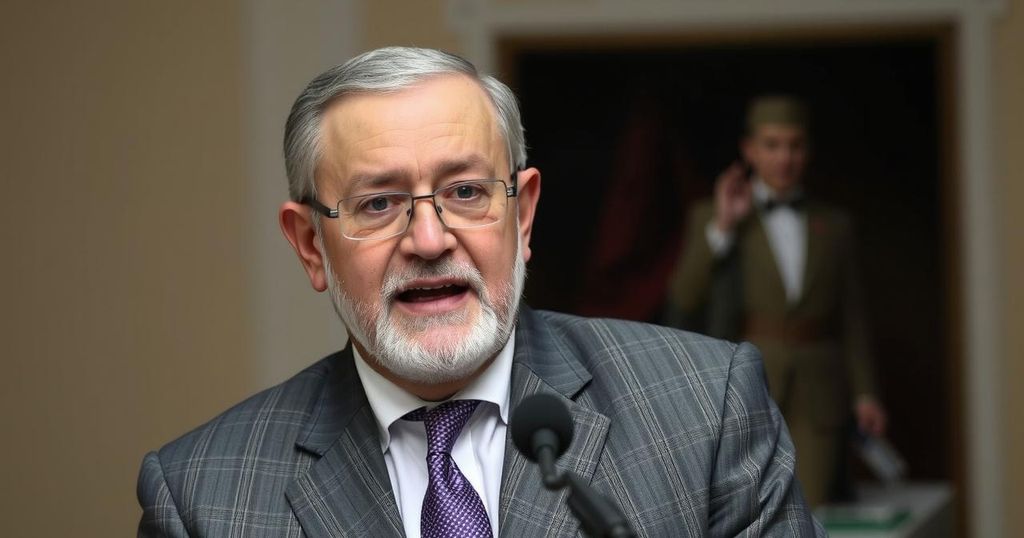Syria’s Elections Could Be Delayed for Four Years, Says Al-Sharaa
Ahmad al-Sharaa, the de facto leader of Syria, announced that elections could take up to four years to organize following the overthrow of the Assad regime. His interim government plans to write a new constitution, potentially taking three years, while also emphasizing the need for infrastructure preparation. Al-Sharaa’s leadership seeks to gain international legitimacy, improving relations with regional powers such as Saudi Arabia and engaging with foreign diplomatic missions.
The de facto leader of Syria, Ahmad al-Sharaa, has indicated that the elections in Syria may not occur for up to four years, a statement marking his first comments regarding an electoral timeline after his group claimed control following the overthrow of Bashar al-Assad. Al-Sharaa, also known as Abu Mohammad al-Jolani and the leader of the Islamist group Hayat Tahrir Al-Sham (HTS), highlighted the necessity of preparing the necessary infrastructure ahead of the elections while planning to draft a new constitution, which he estimated could take three years to complete.
Al-Sharaa emphasized the importance of rebuilding the nation, stating, “We are now in the re-foundation of the country and not just managing the country… there is a lot of destruction in the country because of a regime that ruled for more than 50 years.” He noted that the current opportunity to reshape Syria does not arise frequently and asserted the significance of a constitution to prevent a recurrence of past failures within the governance structure.
Additionally, he announced intentions for his leadership group to eventually dissolve, with the details to be addressed during the forthcoming National Dialogue Conference, though no date has yet been established for this assembly. In terms of international relations, al-Sharaa mentioned a desire for Russia to maintain a beneficial relationship with Syria, amidst reports of military withdrawals following Assad’s ousting.
On the diplomatic front, al-Sharaa received a visit from a Ukrainian delegation, emphasizing shared human experiences between the countries. This visit is part of a broader pattern of international diplomacy aimed at granting legitimacy to al-Sharaa’s leadership, who has notably shifted his public persona from a jihadist figure to a more statesmanlike image. Al-Sharaa has also expressed the necessity for Saudi Arabia to play a pivotal role in Syria’s future, aligning with the new government’s approach to international relations and regional dynamics.
The ongoing situation in Syria remains complex following a long civil conflict that has seen various factions vie for power. Ahmad al-Sharaa’s comments come in the wake of his group’s recent victory over the Assad regime, a development that has significant implications for the future political landscape of the country. As the interim leader of HTS, al-Sharaa is tasked with stabilizing and reconstructing a nation that has endured considerable devastation under decades of authoritarian rule. His remarks regarding elections and constitutional reform point to a broader strategy aimed at reestablishing governance structures and gaining international legitimacy, particularly through engagements with various diplomatic entities recently. Moreover, his welcoming of foreign delegations indicates a shift toward more open international relations as part of the transitional political process in Syria.
In conclusion, Ahmad al-Sharaa’s announcement that elections in Syria may be postponed for up to four years reflects the complex realities of rebuilding the nation after years of conflict and destruction. His leadership aims to establish new governance structures through constitutional reforms and strategic international relationships. The efforts to gain legitimacy and involve regional powers like Saudi Arabia in Syria’s future will be critical in shaping the country’s recovery and political evolution. As the transitional process unfolds, the emphasis on infrastructure development and diplomatic engagement may determine the success of al-Sharaa’s provisional government.
Original Source: www.cnn.com




Post Comment